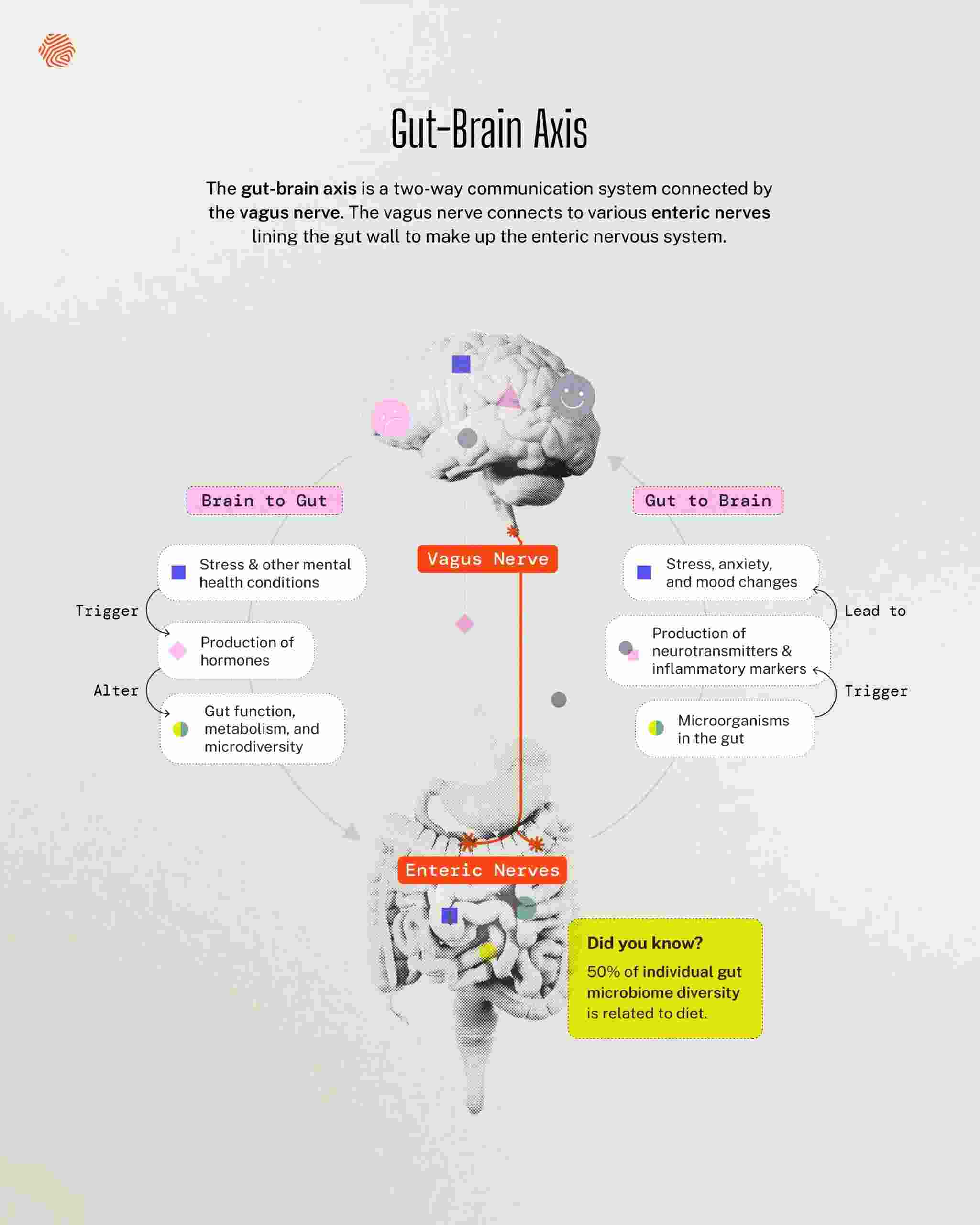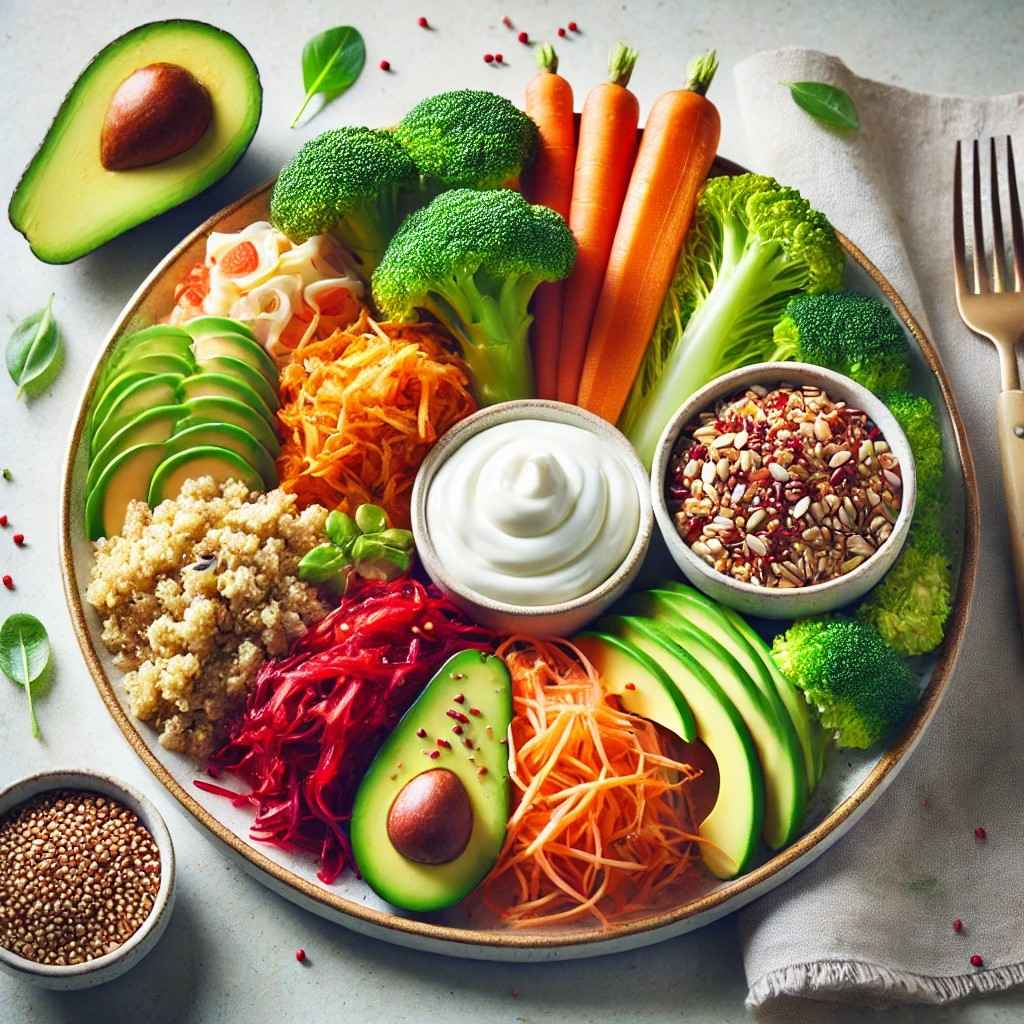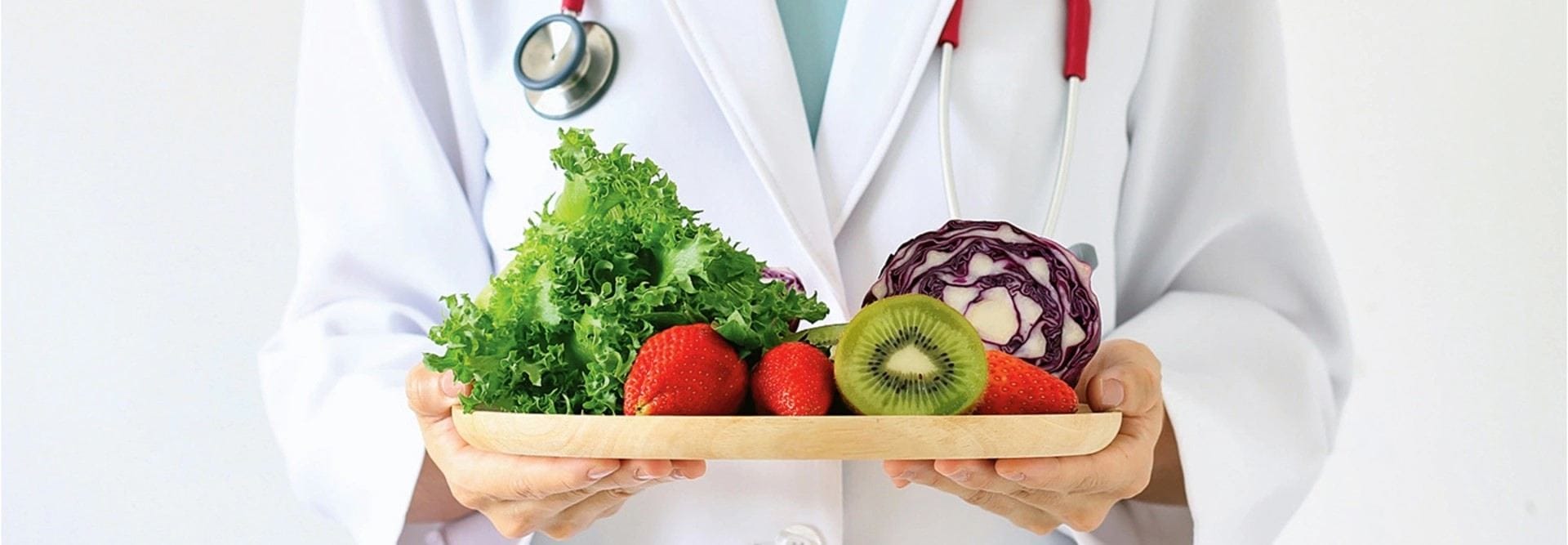The gut biome refers to the trillions of microorganisms, or microbiota, residing in our gastrointestinal (GI) tract. This bustling community of bacteria, viruses, fungi, and other microbes is not just a passive presence; it plays a crucial role in our overall health. Scientists increasingly recognize the gut as a "gateway to health," influencing nearly every aspect of the human body—from digestion to immunity and mental well-being.
The Importance of a Healthy Gut
A well-balanced gut biome is essential for maintaining a healthy body. When the gut is out of balance, it can negatively impact other organs and bodily processes, potentially leading to chronic ailments. Key benefits of a healthy gut include:
- Lower disease risk: A strong gut helps prevent chronic diseases like diabetes, heart disease, and certain cancers.
- Clearer skin: Many skin issues can be traced back to gut health.
- Reduced inflammation and pain: A balanced gut reduces the body’s inflammatory response.
- Stronger immunity: The gut houses much of the immune system.
- Improved mood and cognition: Your gut communicates with your brain, influencing mood and mental clarity.
What Affects the Gut Biome?
Various factors influence the health of your gut biome, including:
- Birthing and feeding methods: Babies born via vaginal delivery tend to have more diverse gut microbiota than those born via C-section. Breastfeeding also promotes a stronger gut biome compared to formula feeding.
- Diet: One of the most critical factors is that diet can nourish or harm your gut. While early tribes like the Tanzanians consumed over 600 different types of foods annually, modern diets often lack variety, averaging just 15 types. How many other foods do you eat in a year?
- Environment and lifestyle: Stress, pollutant exposure, and physical activity also impact gut health.
- Pharmaceuticals: Overuse of antibiotics and other medications can disrupt the natural balance of gut microbiota.
Signs of Poor Gut Health
When the gut biome is imbalanced, the effects ripple throughout the body. Here are some warning signs:
- Leaky gut syndrome: A condition where toxins leak from the gut into the bloodstream, potentially triggering inflammation and autoimmune responses.
- Altered biological age: Poor gut health can accelerate cellular aging, shortening lifespan.
- Digestive issues: Gas, bloating, diarrhea, or constipation are common symptoms of an unhealthy gut.

The Relationship Between the Brain and Gut
The gut is sometimes referred to as the "second brain." Diet and gut health can significantly impact our mood. The Vagus Nerve acts as a key communication pathway between the brain and the gut, transmitting signals that influence digestive processes. Enteric Nerves are part of the enteric nervous system (ENS), a neural network in the GI tract that controls digestion. If unhealthy bacteria and inflammation persist, we may develop afflictions such as depression, anxiety, insomnia, and brain fog. Hormone production of serotonin, norepinephrine, and dopamine are the neurotransmitters between the gut-brain axis that influence processes like gut motility, digestion, and immune function. The bacteria present in the gut can significantly impact the production of neurotransmitters.

Foods for a Healthy Gut
"Food is medicine, and medicine is food." This philosophy underpins the growing trend of treating illnesses with dietary changes rather than medications. To support a robust gut biome, focus on incorporating the following into your diet:
- High-fiber foods: Whole grains, vegetables, and fruits.
- Fermented foods: Yogurt, kefir, sauerkraut, kimchi, and miso are rich in probiotics.
- Nuts and seeds: Almonds, chia seeds, and flaxseeds provide healthy fats and fiber.
- Legumes: Lentils, beans, and chickpeas are excellent sources of fiber and nutrients.

Foods to Avoid for Gut Health
Certain foods and beverages can disrupt the balance of your gut biome, leading to inflammation and other health issues:
- Excess saturated fats
- Refined sugars
- Artificial sweeteners
- Alcohol and caffeine (yes, even coffee!)
By moderating these items, you can help maintain the integrity of your gut lining and microbiota diversity.
Prebiotics, Probiotics, Enzymes
Probiotics are living microorganisms that contribute to a healthy microbiome and digestive health. Probiotics can be found in certain foods or taken as supplements.
Prebiotics are the dietary fiber that feeds probiotic bacteria. They are unnecessary for probiotics to work but can help increase their effectiveness.
The use of prebiotics and probiotics together supports a more diverse microbiome. When a food source contains both prebiotics and probiotics, the combination is sometimes called synbiotics. Synbiotic foods include cheese, kefir, certain types of yogurt, sauerkraut, and kimchi.
Digestive enzymes are non-living proteins that play a key role in helping to break down food so that your body can absorb the nutrients. Digestive enzymes help speed up chemical reactions in your digestive system and break down food so your body can absorb the nutrients. Digestive enzyme supplements can help support healthy digestion. *Consult your physician before adding these supplements to your diet.
Tips for Gut-Friendly Living
Here are some actionable steps to improve your gut health today:
- Experiment with new foods: Challenge yourself to try a new vegetable, grain, or fermented food each week.
- Limit processed foods: Focus on whole, minimally processed ingredients.
- Manage stress: Practice mindfulness, meditation, or yoga to reduce stress.
- Stay hydrated: Proper hydration is essential for digestion and overall gut function.
- Exercise regularly: Physical activity promotes healthy gut bacteria.

The Future of Medicine: Diet as Treatment
The medical community is increasingly recognizing the critical role of diet in treating diseases. Doctors are now prescribing dietary changes alongside or instead of medications for conditions ranging from digestive disorders to mental health issues. The age-old wisdom of "you are what you eat" has never been more relevant.
Conclusion
Your gut biome is a powerful ally in your journey to better health. You can unlock its full potential by nourishing it with diverse, nutrient-rich foods and making mindful lifestyle choices. Remember, every bite matters—not just for your stomach but your entire well-being.
A Call to Action: How Diverse Is Your Diet?
Take a moment to reflect on your eating habits. Are you eating various foods or sticking to the same staples? Aiming for diversity in your diet is one of the simplest and most effective ways to support a healthy gut. Take the first step today: Eat a rainbow, embrace variety, and let your gut guide you to a healthier life. Enhance your overall well-being by joining 'Morning Gems with Swamiji,' held Monday through Friday at 7:30 AM CST / 7:00 PM IST, where you can learn healthy recipes and discover the secrets of nutritious and delicious meals that maintain a healthy digestive system.
JK Yog Offerings
Explore the enriching resources offered by JKYog, where Swamiji’s profound Yogic and Vedic wisdom meets practical tools for transformation. Embark on a journey towards a healthier, more balanced, and fulfilled life with these thoughtfully curated offerings:
- Roop Dhyan Meditation Playlist: Immerse yourself in the soothing practices of Roop Dhyan meditation, where we meditate on the beautiful form of God to deepen our spiritual connection, purify our minds, and cultivate inner peace. Click here to access the playlist.
- Prem Yoga Classes: Experience the harmony of mind, body, and soul through these comprehensive yoga sessions. Discover the joy and vitality that Prem Yoga brings to your daily life. Click here to join the class.
- Swami Mukundananda’s Book - Yoga for the Body, Mind & Soul: Unlock the secrets to holistic well-being with this transformative guide that integrates timeless yogic practices into modern living. Click here to explore the book.
Resources
How Your Gut Microbiome Influences Mental Health, Mood, and Energy
Probiotics, Prebiotics, and Digestive Enzymes
FAQs for a Healthy Gut Biome
1. What is the gut microbiome?
The gut microbiome is the collection of trillions of microorganisms living in your digestive tract, including bacteria, fungi, viruses, and other microbes. These microorganisms are crucial in digestion, immunity, and overall health.
2. Why is a healthy gut microbiome important?
A healthy gut microbiome supports:
- Proper digestion and nutrient absorption
- Strengthened immune function
- Hormone regulation
- Reduced inflammation
- Mental health through the gut-brain axis
3. What foods support a healthy gut biome?
Foods that promote gut health include:
- Probiotic-rich foods: Yogurt, kefir, sauerkraut, kimchi, miso, and kombucha.
- Prebiotic foods: Bananas, garlic, onions, asparagus, leeks, and whole grains.
- High-fiber foods: Fruits, vegetables, legumes, nuts, and seeds.
- Fermented foods: Pickles, tempeh, and certain cheeses.
4. Are there foods that harm the gut microbiome?
Yes, foods that can negatively impact gut health include:
- Processed and high-sugar foods
- Artificial sweeteners
- Excessive alcohol
- High-fat diets with low fiber
- Overuse of antibiotics without medical necessity
5. How do probiotics and prebiotics differ?
- Probiotics are live beneficial bacteria in certain foods and supplements that help maintain a healthy microbiome.
- Prebiotics are non-digestible fibers that feed the good bacteria in your gut.
6. Can stress affect my gut health?
Yes, stress can disrupt the balance of your gut microbiome. Mindfulness, meditation, regular exercise, and adequate sleep can help manage stress and support gut health.
7. How does exercise influence gut health?
Regular moderate exercise promotes the growth of beneficial gut bacteria, reduces inflammation, and enhances overall gut function.
8. What role does hydration play in gut health?
Staying hydrated helps maintain the mucosal lining of the intestines and supports digestion and nutrient absorption.
9. Can antibiotics harm the gut microbiome?
Antibiotics can disrupt gut bacteria's balance by killing harmful and beneficial bacteria. Probiotic supplements or probiotic-rich foods can help restore balance after antibiotic use.
10. Are there supplements that can help improve gut health?
Common supplements for gut health include:
- Probiotics: To add beneficial bacteria.
- Prebiotics: To nourish existing good bacteria.
- Digestive enzymes: To aid in digestion.
- Fiber supplements: For individuals who struggle to get enough dietary fiber.
11. How long does it take to improve gut health?
Improving gut health can take weeks to months, depending on diet, lifestyle changes, and individual conditions. Consistency is key.
12. What are the signs of an unhealthy gut?
Symptoms of an unhealthy gut include:
- Frequent bloating, gas, or diarrhea
- Constipation
- Food intolerances
- Fatigue or sleep disturbances
- Skin issues such as eczema
- Weakened immunity
13. How does the gut microbiome affect mental health?
The gut and brain are connected through the gut-brain axis. A healthy microbiome can positively influence mood and mental health by producing neurotransmitters like serotonin.
14. Can fasting improve gut health?
Intermittent fasting or time-restricted eating may promote gut health by giving the digestive system time to rest and encouraging the growth of beneficial bacteria.
15. Do children and adults require different strategies for gut health?
Yes, children and adults may have different dietary needs. For example, children may benefit more from simple whole foods like fruits, vegetables, and dairy probiotics. At the same time, adults may require targeted prebiotic and fiber-rich diets based on individual health conditions.



